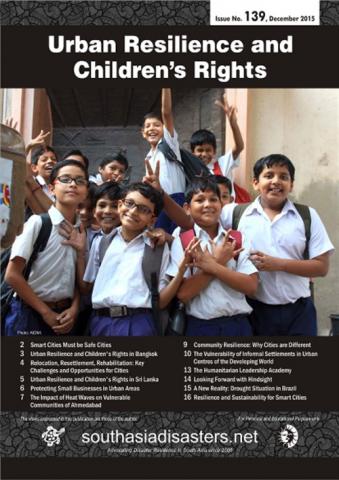Urban Resilience and Children’s Rights


This issue of Southasiadisasters.net focuses on the theme of ‘Child Centered Disaster Management Planning in India.’ As widespread poverty and climate change exacerbate the risk of disasters on children, it is time to embed corrective policy mechanisms that protect children against such risks. State and district disaster management plans are the instruments through which this objective can be accomplished.
This issue highlights the ways in which children’s rights to safety can be upheld in India. Most notably, the traditional knowledge of communities in reducing the risks of hazards has been discussed. Special attention has also been accorded to how the Sendai Framework for Disaster Risk Reduction (SFDRR) enshrines the protection of children against disaster risks.
southasiadisaster.net , 2015
